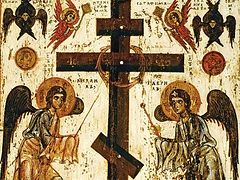
Belief is a strange thing. It rests like an idea in our mind. We can examine it, walk around it, argue it, and change it or reject it. But as an idea, belief really isn’t such a big thing. It is probably quite correct to say that most of the things we “believe” make no difference whatsoever. This is especially true of what most people mean when they say, “I believe in God.”
Belief in God, the Christian God, not only carries consequences, but only matters as it carries consequences. Classically, it can be described as “keeping the commandments.” There is a particular aspect of such belief (and the commandments) that I think is largely ignored, even though it goes to the very heart of believing in the Christian God. It is, in effect, what I call the “secular option.”
A simple way of considering any matter in the light of this belief is by asking the question, “How would what I’m thinking be different if there really were a God and everything He said is true?” That might sound too obvious. However, for years I have watched otherwise faithful Christians act as if there were no God, particularly when it comes to things that matter to them or that feel somehow endangered. This has sometimes been called, “practical atheism.”
I believe it is a particularly attractive temptation for Americans because we are such a practical people. Our culture, formed and shaped by modernity, is deeply “utilitarian.” We can justify doing almost anything “because it works.” When problems arise, we try to fix them. This same drive, in the life of the Church, can often lead to practical atheism.
Obviously, “fixing things” is not inherently sinful. But fixing things as a matter of utility is. The Christian life is properly led in obedience to Christ’s commandments. We do things because doing them is an obedience to Christ Himself. The drive to practicality often carries within it a certain amount of “necessary evil.” We do a bit of harm in order to arrive at a greater good. This is atheism, regardless of the greatness of the good. We find ourselves trying to do the “heavy lifting” for God, because, we do not trust that He’ll do it Himself. This is the inherent temptation of “making a better world.” We have no such commandment from God. Every atheist regime that has existed has done so in the name of a better world.
I have served as a parish priest for around 35 years. The microcosm that is a parish is filled with temptations. There are problems that beg to be fixed (most of them are associated with one or more personalities). As a young priest, I fancied myself to be a “problem solver.” A good parish, I thought, was a happy parish. Conflict and crisis were things to be managed. I even took a number of courses in seminary that were focused on “management.” And this, I believe, was the secular option, the breeding ground of despair and unbelief.
Why despair and unbelief? Despair is the absence of hope. Management is the antithesis of hope. It is rooted in persuasion and control. Problems are obstacles to success. The management of what is, essentially, an all-volunteer membership is a never-ending battle. At some point, exhaustion wins out. Unbelief is always at hand for the manager. Cynicism easily takes hold, as the reality of parish life repeatedly fails to meet all hopeful expectations. In the face of failure, the manager begins to wonder where God is in the midst of everything, or even whether there is a God in the midst of everything.
However, consider St. Paul’s assessment of the Church:
Brothers and sisters, think of what you were when you were called. Not many of you were wise by human standards; not many were influential; not many were of noble birth. But God chose the foolish things of the world to shame the wise; God chose the weak things of the world to shame the strong. God chose the lowly things of this world and the despised things– and the things that are not– to bring to nothing the things that are… (1Co 1:26-28)
Parish managers inevitably tend to minimize the sick in order to take advantage of those who are most well. However, the fathers say that the Church is a hospital, which means that it is full of sick people. The very constitution of the Church stands in the way of success.
This is the point. Winning and success are nothing of great value. Only faithfulness to God matters. What, in fact, counts for “success” in the Kingdom of God may very well be judged as abject failure by the world. It has repeatedly been the case throughout the history of the Church that the work of a saint is only made manifest after their death. The work of the Kingdom is hidden, unseen by those who dare to judge.
This requires belief in God. More than that, it requires belief in the Crucified God. As frightening as it may sound, every failure, every collapse has the potential of the Cross. If, as the Elder Sophrony says, “The way down is the way up,” then the weak and the sick are much further on the road to salvation than all the others. It has always struck me as odd that we hear in Christ’s words “take up your Cross and follow me,” an admonition to a bold effort of strength, echoed in the words of the old Anglican Prayer Book description of the baptized life: “…manfully to fight under His banner, against sin, the world, and the devil; and to continue Christ’s faithful soldier and servant unto his life’s end.” This phrase always caused me to picture the Church as an army of Cross-wielding soldiers, smashing everything that got in their way. That, of course, is true. But the army and the smashing are extremely paradoxical. Smashing frequently looks like losing, and the army a rag-tag group of wounded stragglers.
I especially see despair and unbelief come to the fore when people turn their attention to the Church in its larger aspects. We can grasp, perhaps, that God works victory through our own weakness, but we cannot abide that weakness when we see it in leaders or in the structures they inhabit. For some reason, the higher we look in the ranks of the Church, the less tolerant we become of the weakness and foolishness that are the chosen lot of all Christians. Bishops and Synods trundle along, Holy and Great Councils falter, all accompanied by the calumny and condemnation of others. The Book of Acts glosses over the first Council in Jerusalem, and portrays the steady hand of St. James who stands up and says, “It is my judgment…” and peace ensues. Of course, the letters of St. Paul provide ample evidence that peace did not ensue, and we can assume that the meeting in Jerusalem was bumpier than reported.
The Holy Glorious and All-Laudable Apostles themselves were not able to effectively manage the smooth operation of the Church. However, we can assume that they knew better. St. Paul certainly did. He described the Apostles as the “scum of the earth” (περικαθάρματα τοῦ κόσμου).
We are saved only through the Cross. There is no salvation in strength, only in weakness. We will either come to know God in the communion of His sufferings (Phil 3:10) or we will never know Him. We either believe in the Crucified God or we believe in no God at all.
The commandments of Christ point us in that direction:
Do not render evil for evil. Do not resist evil. Bless those who curse you.
To this I would add, “Do not judge the failings of others, for God has chosen such to lead you into the Kingdom of Heaven.”
At the Cross, evil appeared to triumph. Christ’s refusal to defend Himself must have completely bewildered His disciples. But only in that seeming defeat is the final truth of who God is revealed. You cannot know the crucified Christ if you refuse to be crucified with Him. If you are afraid to lose, then you will never win – at least not the only victory that matters.
I remember that during a terrible storm, Jesus was asleep in the back of the boat. “My Lord! Don’t you care if we perish?”
Jesus has been asleep in the back of the boat for a very long time. But the winds and the seas obey Him. If you believe in Him, you can occasionally get a good night’s sleep as well.
Believe in God. Turn the world over to him and get some peace. Everything else is idolatry.



